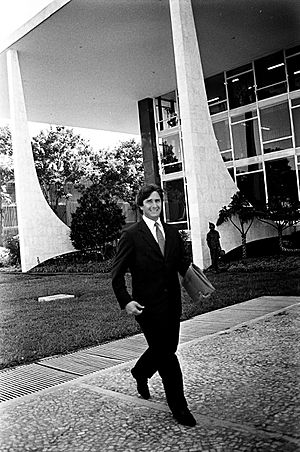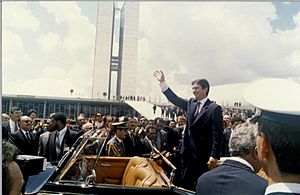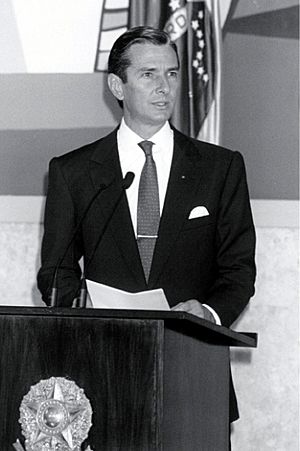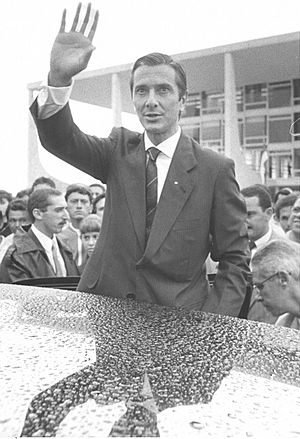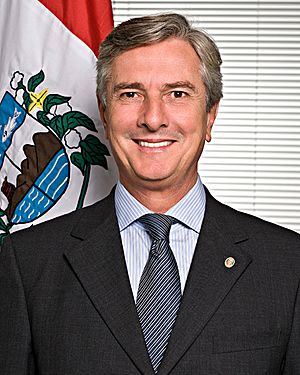Fernando Collor de Mello facts for kids
Quick facts for kids
Fernando Collor de Mello
GCTE
|
|
|---|---|
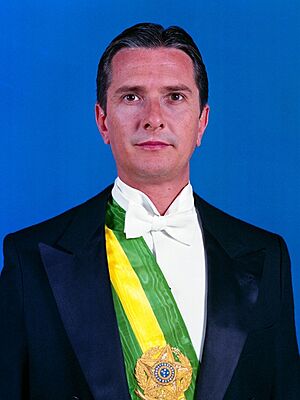
Official portrait, 1992
|
|
| 32nd President of Brazil | |
| In office 15 March 1990 – 29 December 1992 Suspended powers and duties 2 October 1992 – 29 December 1992 |
|
| Vice President | Itamar Franco |
| Preceded by | José Sarney |
| Succeeded by | Itamar Franco |
| Senator for Alagoas | |
| In office 1 August 2019 – 1 February 2023 |
|
| Preceded by | Renilde Bulhões |
| Succeeded by | Renan Filho |
| In office 1 February 2007 – 1 April 2019 |
|
| Preceded by | Heloísa Helena |
| Succeeded by | Renilde Bulhões |
| Governor of Alagoas | |
| In office 15 March 1987 – 14 May 1989 |
|
| Vice Governor | Moacir de Andrade |
| Preceded by | José Tavares |
| Succeeded by | Moacir de Andrade |
| Member of the Chamber of Deputies | |
| In office 1 February 1983 – 15 July 1986 |
|
| Constituency | Alagoas |
| Mayor of Maceió | |
| In office 1 January 1979 – 1 January 1983 |
|
| Preceded by | Dílton Simões |
| Succeeded by | Corinto Campelo |
| Personal details | |
| Born | 12 August 1949 Rio de Janeiro, Federal District, Brazil |
| Political party | PRD (2023–present) |
| Other political affiliations |
See list
ARENA (1979)
PDS (1980–1985) PMDB (1986–1988) PRN (1989–1992) PRTB (1999–2006) PTB (2007–2016) PTC (2016–2019) PROS (2019–2022) PTB (2022–2023) |
| Spouses |
Celi Elisabete Júlia "Lilibeth" Monteiro de Carvalho
(m. 1975; div. 1981)Rosane Brandão Malta
(m. 1981; div. 2005)Caroline Serejo Medeiros
(m. 2006) |
| Children | 5 |
| Parents | Arnon de Melo Leda Collor |
| Residences | Maceió, Alagoas |
| Alma mater | University of Brasília |
| Signature | |
Fernando Affonso Collor de Mello, born on August 12, 1949, is a Brazilian politician. He served as the 32nd president of Brazil from 1990 to 1992. He was the first president chosen by the people after a long period of military rule in Brazil.
Collor became the youngest president in Brazil's history, taking office when he was 40 years old. His time as president ended when he resigned during a process to remove him from office. After leaving the presidency, he later served as a Senator for the state of Alagoas from 2007 to 2023.
Contents
Early Life and Political Beginnings
Fernando Collor was born on August 12, 1949. His family was well-known in politics. His father, Arnon de Melo, was a governor and later a senator for the state of Alagoas. Fernando has two brothers, Pedro and Leopoldo, and two sisters, Ledinha and Ana. His grandfather, Lindolfo Collor, was also a public figure.
Even though he was born in Rio de Janeiro, Fernando spent his childhood in different cities like Maceió and Brasília. He studied economic sciences and graduated in 1972. That same year, he became the president of a newspaper called Gazeta de Alagoas, which his family owned.
Collor married his first wife, Celi Elisabete Júlia Monteiro de Carvalho, in 1975. They had two children. He later married Rosane Malta in 1984, who became the First Lady. In 2006, he married Caroline Medeiros, and they had two children. He also has another child.
In 1976, Collor became the president of a Brazilian football club called Centro Sportivo Alagoano (CSA). He then entered politics, becoming the mayor of Maceió in 1979. After that, he was elected as a federal deputy in 1982. In 1986, he became the governor of Alagoas.
As governor, he became famous across the country for trying to reduce high salaries among public servants. He called these public servants marajás, comparing them to wealthy Indian princes. This stance made him very popular, especially because he appeared on national TV, which was unusual for a governor from a smaller state.
Presidency (1990–1992)
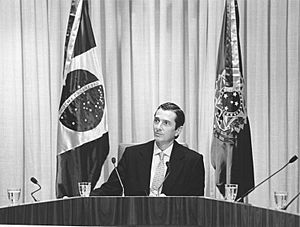
In 1989, Fernando Collor won the presidential election against Luiz Inácio Lula da Silva. He received 35 million votes. He was the first president of Brazil elected by popular vote in 29 years. When he started his presidency, Brazil was facing a big problem with inflation, where prices were rising very quickly, sometimes by 25% each month.
On his first day in office, Collor launched a plan called the Plano Collor. This plan aimed to control the high inflation. One of its main actions was to temporarily freeze large amounts of money in people's bank accounts. This was a very strong measure, and people had mixed feelings about it.
Economic Changes and Government Actions
During Collor's presidency, Brazil saw many big changes in its economy. His government worked to open up the country's market to international trade. They also started a program to sell government-owned companies to private businesses, which is called privatization. These changes were meant to modernize the economy and reduce government spending.
Even with these efforts, inflation remained a challenge. The government tried different versions of the economic plan, but it was hard to make lasting improvements.
Despite the economic difficulties, Collor's government achieved some notable things. In 1991, he signed the Treaty of Asunción, which created Mercosur, a trade group for countries in South America. He also combined two government agencies to create the National Social Security Institute (INSS), which helps with social security benefits.
Collor also led the "Earth Summit" (ECO-92) in Brazil, an important international meeting about the environment. His government also officially recognized the land rights of the Yanomami Indigenous Territory, protecting their traditional lands.
His administration also received awards for health programs. In 1991, UNICEF recognized three health programs, including community agents and measles eradication, as some of the best in the world. Brazil's vaccination program also won a United Nations prize for being the best in South America during his time.
Challenges and Resignation
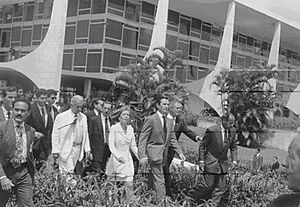
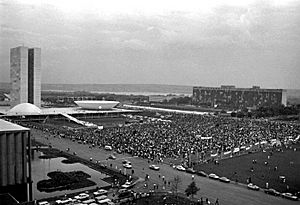
In 1992, Fernando Collor faced serious accusations regarding his government. His own brother, Pedro Collor, made claims about improper financial activities involving a close associate. These accusations led to a large investigation by the Brazilian Congress.
As the investigation continued, many people, especially students, protested in the streets. These students were known as "Caras-pintadas" (Painted Faces) because they often painted their faces with the colors of the Brazilian flag. They called for Collor to be removed from office.
On September 29, 1992, the Chamber of Deputies voted to start the process of removing Collor from his position. This process is called impeachment. On October 2, 1992, Collor's presidential powers were temporarily suspended, and his vice president, Itamar Franco, became the acting president.
As the trial in the Federal Senate was nearing its end in December 1992, it became clear that Collor would be found responsible. To avoid this, he resigned from the presidency on December 29, 1992. However, the Senate decided to continue the trial. They found him responsible for the accusations and ruled that he could not hold public office for eight years.
Later, in 1994, the Brazilian Supreme Court looked into the criminal accusations against Collor. They found him not guilty due to a lack of strong evidence. Even so, the Senate's decision to bar him from public office remained in place. Collor regained his political rights in 2000.
After the Presidency
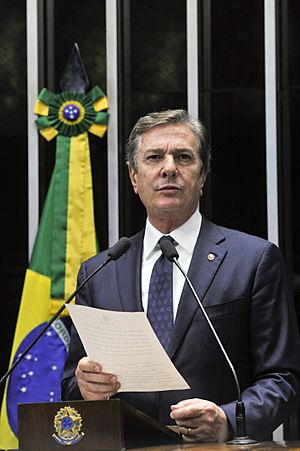
After his presidency, Fernando Collor stayed out of the spotlight for some time. In 2000, he tried to run for mayor of São Paulo, but he was not allowed because his political rights were still suspended. In 2002, with his political rights restored, he ran for Governor of Alagoas but did not win.
In 2006, Collor was elected to the Federal Senate, representing his home state of Alagoas. He won with 44.03% of the votes. He was re-elected as a Senator in 2014. During his time as Senator, he served as Chairman of the Senate Infrastructure Commission.
In 2022, Collor ran for Governor of Alagoas again but finished third and did not make it to the final round of voting. In April 2025, a judge ordered his arrest to begin serving a prison sentence related to accusations of receiving money improperly. He was arrested by the Brazilian Federal Police. A few days later, he was allowed to be under house arrest for health reasons.
Honors and Awards
Fernando Collor has received several honors from other countries:
 Malaysia: Honorary Recipient of the Order of the Crown of the Realm (1991)
Malaysia: Honorary Recipient of the Order of the Crown of the Realm (1991) Portugal: Grand Cross of the Order of the Tower and Sword (1991)
Portugal: Grand Cross of the Order of the Tower and Sword (1991) Spain: Collar of the Order of Isabella the Catholic (1991)
Spain: Collar of the Order of Isabella the Catholic (1991)
See also
 In Spanish: Fernando Collor de Mello para niños
In Spanish: Fernando Collor de Mello para niños
- List of mayors of Maceió
 | Percy Lavon Julian |
 | Katherine Johnson |
 | George Washington Carver |
 | Annie Easley |


